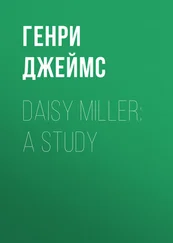“Are you sure it is your mother? Can you distinguish her in this thick dusk?” Winterbourne asked.
“Well!” cried Miss Daisy Miller, with a laugh, “I guess I know my own mother. And when she has got on my shawl, too! She is always wearing my things.”
The lady in question, ceasing to advance, hovered vaguely about the spot at which she had checked her steps.
“I am afraid your mother doesn’t see you,” said Winterbourne. “Or perhaps,” he added – thinking, with Miss Miller, the joke permissible – “perhaps she feels guilty about your shawl.”
“Oh, it’s a fearful old thing!” the young girl replied, serenely. “I told her she could wear it. She won’t come here, because she sees you.”
“Ah, then,” said Winterbourne, “I had better leave you.”
“Oh no; come on!” urged Miss Daisy Miller.
“I’m afraid your mother doesn’t approve of my walking with you.”
Miss Miller gave him a serious glance. “It isn’t for me; it’s for you – that is, it’s for her. Well; I don’t know who it’s for! But mother doesn’t like any of my gentlemen friends. She’s right down timid. She always makes a fuss if I introduce a gentleman. But I do introduce them – almost always. If I didn’t introduce my gentlemen friends to mother,” the young girl added, in her little soft, flat monotone, “I shouldn’t think I was natural.”
“To introduce me,” said Winterbourne, “you must know my name.” And he proceeded to pronounce it.
“Oh, dear; I can’t say all that!” said his companion, with a laugh. But by this time they had come up to Mrs. Miller, who, as they drew near, walked to the parapet of the garden and leaned upon it, looking intently at the lake and turning her back upon them. “Mother!” said the young girl, in a tone of decision. Upon this the elder lady turned round. “Mr. Winterbourne,” said Miss Daisy Miller, introducing the young man very frankly and prettily. “Common,” she was, as Mrs. Costello had pronounced her; yet it was a wonder to Winterbourne that, with her commonness, she had a singularly delicate grace.
Her mother was a small, spare, light person, with a wandering eye, a very exiguous nose, and a large forehead, decorated with a certain amount of thin, much-frizzled hair. Like her daughter, Mrs. Miller was dressed with extreme elegance; she had enormous diamonds in her ears. So far as Winterbourne could observe, she gave him no greeting – she certainly was not looking at him. Daisy was near her, pulling her shawl straight. “What are you doing, poking round here?” this young lady inquired; but by no means with that harshness of accent which her choice of words may imply.
“I don’t know,” said her mother, turning towards the lake again.
“I shouldn’t think you’d want that shawl!” Daisy exclaimed.
“Well – I do!” her mother answered, with a little laugh.
“Did you get Randolph to go to bed?” asked the young girl.
“No; I couldn’t induce him,” said Mrs. Miller, very gently. “He wants to talk to the waiter. He likes to talk to that waiter.”
“I was telling Mr. Winterbourne,” the young girl went on; and to the young man’s ear her tone might have indicated that she had been uttering his name all her life.
“Oh, yes!” said Winterbourne; “I have the pleasure of knowing your son.”
Randolph’s mamma was silent; she turned her attention to the lake. But at last she spoke. “Well, I don’t see how he lives!”
“Anyhow, it isn’t so bad as it was at Dover,” said Daisy Miller.
“And what occurred at Dover?” Winterbourne asked.
“He wouldn’t go to bed at all. I guess he sat up all night – in the public parlour. He wasn’t in bed at twelve o‘clock: I know that.”
“It was half-past twelve,” declared Mrs. Miller, with mild emphasis.
“Does he sleep much during the day?” Winterbourne demanded.
“I guess he doesn’t sleep much,” Daisy rejoined.
“I wish he would!” said her mother. “It seems as if he couldn’t.”
“I think he’s real tiresome,” Daisy pursued.
Then, for some moments, there was silence. “Well, Daisy Miller,” said the elder lady, presently, “I shouldn’t think you’d want to talk against your own brother!”
“Well, he is tiresome, mother,” said Daisy, quite without the asperity of a retort.
“He’s only nine,” urged Mrs. Miller.
“Well, he wouldn’t go to that castle,” said the young girl. “I’m going there with Mr. Winterbourne.”
To this announcement, very placidly made, Daisy’s mamma offered no response. Winterbourne took for granted that she deeply disapproved of the projected excursion; but he said to himself that she was a simple, easily-managed person, and that a few deferential protestations would take the edge from her displeasure. “Yes,” he began; “your daughter has kindly allowed me the honour of being her guide.”
Mrs. Miller’s wandering eyes attached themselves, with a sort of appealing air, to Daisy, who, however, strolled a few steps farther, gently humming to herself. “I presume you will go in the cars,” said her mother.
“Yes; or in the boat,” said Winterbourne.
“Well, of course, I don’t know,” Mrs. Miller rejoined. “I have never been to that castle.”
“It is a pity you shouldn’t go,” said Winterbourne, beginning to feel reassured as to her opposition. And yet he was quite prepared to find that, as a matter of course, she meant to accompany her daughter.
“We’ve been thinking ever so much about going,” she pursued; “but it seems as if we couldn’t. Of course Daisy – she wants to go round. But there’s a lady here – I don’t know her name – she says she shouldn’t think we’d want to go to see castles here; she should think we’d want to wait till we got to Italy. It seems as if there would be so many there,” continued Mrs. Miller, with an air of increasing confidence. “Of course, we only want to see the principal ones. We visited several in England,” she presently added.
“Ah, yes! in England there are beautiful castles,” said Winterbourne. “But Chillon, here, is very well worth seeing.”
“Well, if Daisy feels up to it [14] feels up to it – ( разг. ) в состоянии
– — ,” said Mrs. Miller, in a tone impregnated with a sense of the magnitude of the enterprise. “It seems as if there was nothing she wouldn’t undertake.”
“Oh, I think she’ll enjoy it!” Winterbourne declared. And he desired more and more to make it a certainty that he was to have the privilege of a tête - à -tête with the young lady, who was still strolling along in front of them, softly vocalising. “You are not disposed, madam,” he inquired, “to undertake it yourself?”
Daisy’s mother looked at him, an instant, askance, and then walked forward in silence. Then – “I guess she had better go alone,” she said, simply.
Winterbourne observed to himself that this was a very different type of maternity from that of the vigilant matrons who massed themselves in the forefront of social intercourse in the dark old city at the other end of the lake. But his meditations were interrupted by hearing his name very distinctly pronounced by Mrs. Miller’s unprotected daughter.
“Mr. Winterbourne!” murmured Daisy.
“Mademoiselle!” said the young man.
“Don’t you want to take me out in a boat?”
“At present? [15] At present? – ( зд. ) Прямо сейчас?
” he asked. “Of course!” said Daisy.
“Well, Annie Miller!” exclaimed her mother.
“I beg you, madam, to let her go,” said Winterbourne, ardently; for he had never yet enjoyed the sensation of guiding through the summer starlight a skiff freighted with a fresh and beautiful young girl.
Читать дальше












